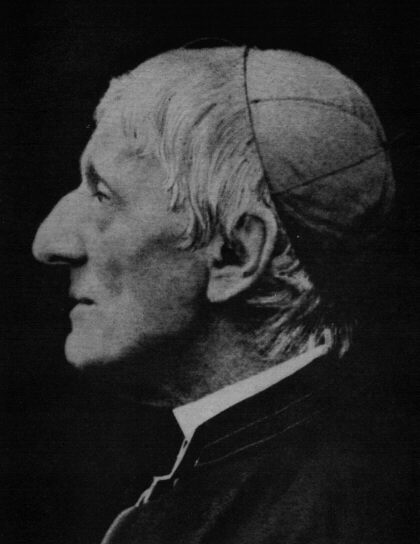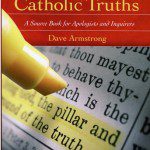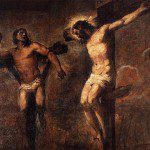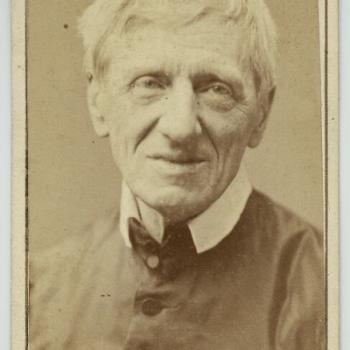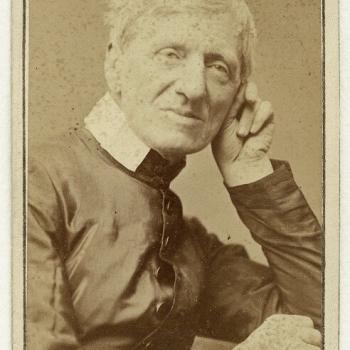[19 October 2004]
* * * * *
Then there is the Grammar‘s method that looks very similar to what later took by storm the philosophical and theological scene under the name phenomenology. It stands for a systematic aversion, to use a Pauline phrase again, to reasoned assurance about things that do not appear, that is, are not phenomena. Finally, there is the perspective of the Grammar, a perspective of unabashed personalism.
(Jaki [1] )
In the analytic tradition, which is dominant here and in much of the United States, the beginning of modern philosophy is often taken to be the writing, by Gottlob Frege, of an essay entitled Begriffschrift in 1879.
. . . Ten years before the Begriffschrift, in the Grammar of Assent, Newman had made many of the same distinctions which Frege was to make, sometimes in the same terms, sometimes in different terms. Newman distinguished between the apprehension of a proposition and assent to a proposition, between the notional or logical content of a proposition and the realization of its content in the imagination. But whereas Frege disjoined logic from psychology in order to discard the psychology, Newman disjoined the two to downgrade the logic. Unknown to Newman, the logic which he downgraded was in its last days.
. . . in recent decades professional philosophers in the analytic tradition have become interested in the topics which concerned him.
. . . Wittgenstein turned in his last years to the traditional problems of epistemology, seen from a new standpoint. His posthumously published On Certainty covers many of the same topics as the Grammar of Assent, uses many of the same illustrations, and draws some of the same conclusions.
The most influential philosopher of religion in the analytic tradition at the present time, Alvin Plantinga of Notre Dame University, has devoted much of his best work to the question which is at the centre of Newman’s book: How can religious belief be justified, given that the evidence for its conclusions seems so inadequate to the degree of its commitment?
(Kenny, 98-100)
Newman’s approach to the philosophical topics which he discussed was that of a Christian apologist. That is to say, he wrote from the point of view of a Christian believer who asks himself to what extent, and in what way, his faith can be shown to be reasonable. Newman made no pretence of temporarily discarding his faith, as it were, in order to give the impression of starting all over again from scratch . . . it was a question of faith seeking understanding of itself rather than of an unbelieving mind wondering whether there was any rational justification for making an act of faith.
. . . his attempt to exhibit the insufficiency of contemporary rationalism and to convey a sense of the Christian vision of human existence led him to delineate lines of thought which, while certainly not intended to present the content of Christian belief as a set of conclusions logically deduced from self-evident principles, were meant to show to those who had eyes to see that religious faith was not the expression of an irrational attitude or a purely arbitrary assumption.
. . . Newman . . . is more concerned with showing the reasonableness of faith as it actually exists in the great mass of believers, most of whom know nothing of abstract philosophical arguments . . . he tries to outline a phenomenological analysis . . .
. . . it is obvious that the belief in God with which he is primarily concerned as a Christian apologist is a real assent to God as a present reality, and an assent which influences life or conduct, not simply a notional assent to a proposition about the idea of God . . . from this it follows that Newman is not, and cannot be, primarily interested in a formal demonstrative inference to God’s existence.
(Copleston, 270-271, 279)
He argues . . . that the rationalist conception of reasoning is far too narrow and does not square with the way in which people actually, and legitimately, think and reason in concrete issues. It must be remembered that his contention is that faith is reasonable, not that its content is logically deducible according to the model of mathematical demonstration.
(Copleston, 276)
. . . the growth of interest in his philosophical thought and in his style of apologetics has coincided with the spread of movements in philosophy and in apologetics which, on our looking back, are seen to have certain affinities with elements in Newman’s reflections.
(Copleston, 287-288)
Newman was taken up so much with the concrete, tangible facts as to create time and again the momentary impression of being a latter-day follower of Ockham, if not a replica of Mister Gradgrind teaching but facts and nothing but facts.
(Jaki [2], 201)
He was nominalistic in temper . . .
(Kenny, 100)
We reason in order to enlarge our knowledge of matters, which do not depend on us for being what they are.
. . . Science, working by itself, reaches truth in the abstract, and probability in the concrete; but what we aim at is truth in the concrete.
. . . There is no such thing as stereotyped humanity; it must ever be a vague, bodiless idea, because the concrete units from which it is formed are independent realities. General laws are not inviolable truths; much less are they necessary causes.
( Grammar, 222-224)
. . . as to reasonings in concrete matters, they are never more than probabilities, and the probability in each conclusion which we draw is the measure of our assent to that conclusion . . . Abstract argument is always dangerous . . . I prefer to go by facts.
(Grammar, 136)
We are in a world of facts, and we use them; for there is nothing else to use.
(Grammar, 272)
By means of sense we gain knowledge directly; by means of reasoning we gain it indirectly, that is, by virtue of a previous knowledge.
(Grammar, 210)
What is the Relationship of Cardinal Newman’s Thought to Aristotle and Scholasticism?
The answer is not to be sought in Newman’s reading of Thomas Aquinas or other scholastics, a reading rather limited.
(Jaki [1] )
. . . reading of modern philosophers which, with the exception of J. S. Mill, was not extensive at all. He showed much too great a sympathy for Bacon, Locke, and Bishop Butler, for him the par excellence British philosophers.
(Jaki [1] )
We are inclined simply to say that he is in the tradition of Augustine and Anselm. Credo ut intelligam is the pervading maxim of his thought and to love the truth, and thus to believe or to move towards belief, is to be filled with the Divine love. Again, we may see in him an anticipation of the Kierkegaardian doctrine of the leap of faith, a leap which presupposes a cognitive gap, as it were, between what we know and what we are called upon to believe.
(Cameron)
Newman . . . was a philosopher in the British empiricist tradition. When he argues he argues with Locke and Hume. He was ill at ease, in his Catholic as well as his Anglican days, with scholastic philosophy.
(Kenny, 100)
Predictably, it was criticized in the Month and the Tablet for its obvious lack of conformity with scholastic philosophy. Newman was not very concerned: it was clear to him that syllogistic reasoning would not solve the problem he had attempted to meet.
. . . The reviews in secular journals were not concerned with the absence of scholastic philosophy, but they noted that the Grammar was in the tradition of Butler’s Analogy and the Oriel ‘Noetics’ rather than of contemporary thought.
(Ker, 637-638)
Fr. Copleston denies that Aristotle was a key player for Newman:
As a student Newman acquired some knowledge of Aristotle. And though nobody would call him an Aristotelian, the Greek philosopher certainly exercised some influence on his mind . . . Of British philosophers he certainly studied Francis Bacon, and he knew something of Hume, whom he considered acute but dangerous; but in the Apologia he states that he never studied Berkeley. For Locke, however, he felt a profound respect . . . ‘there is so much in his remarks upon reasoning and proof in which I fully concur . . . ‘ Besides Locke we must mention Bishop Butler, who exercised an obvious and admitted influence on Newman’s mind . . . Of German thought, however, Newman appears to have known little . . . As for Scholastic philosophy, Newman knew little about it . . . the old-fashioned textbook Thomism would hardly have been congenial to Newman’s mind . . . His approach was quite different.
(Copleston, 273-274)
What Was Cardinal Newman’s Opinion of Idealism, Platonism, and Universals?
He has more scorn than praise for the universals. He does not once take into consideration that every human word stands for a universal. Time and again he seems to give comfort to those who, then as now, take the view that the question of universals can be disposed of by labeling it a scholastic problem.
. . . Perhaps part of Newman’s saving grace was that he left uncut half of the pages of his copy of Meiklejohn’s translation of Kant’s Critique of Pure Reason. At any rate, he saw through Kant and the German idealists. His comment on the monograph on them by Chalybaus, professor of philosophy at the university of Kiel, was as brief as devastating: “I do not think I am bound to read them . . . for notoriously they have come to no conclusion.” Transcendental Thomists, better to be called Aquikantists, may take note. If conclusions, to which assent is to be given, can ever be the fruit of mere philosophical reasoning, however genuine, they certainly cannot issue from the miscegenation which transcendental Thomists try to bring about between Aquinas and Kant.
(Jaki [1] )
. . . when Newman explicitly speaks of universals, he comes very close to denying any real content in them . . . He has little use for general man, which he calls the auto-anthropos. For him universals are wholly subservient to individual things.
. . . Newman’s thinking is poles apart from Kantianism, and even from that Aquikantianism that is transcendental Thomism, as shown by his flat declaration: “By means of sense we gain knowledge directly.” The Kantian principle whereby the mind’s categories create reality is contradicted by Newman’s statement: “We reason in order to enlarge our knowledge of matters, which do not depend on us for being what they are.”
(Jaki [2], 201; citing Grammar, 210, 222)
Newman insists that his purpose is not metaphysical, like that of the idealists who defend the certainty of knowledge against sceptical empiricists, but is ‘of a practical character, such as that of Butler in his Analogy‘, namely, to ascertain the nature of inference and assent.
In the last analysis, then, the Grammar is not a ‘metaphysical’ work. But that does not mean it is a ‘psychological’ study. Rather, it is a philosophical analysis of that state of mind which we ordinarily call certitude or certainty and of the cognitive acts associated with it; and as such, it has come to be recognized as a classic by philosophers of religion.
(Ker, 646, 649)
In philosophical background he was deeply committed to Locke . . . Locke was famous for his attack on the notion of innate ideas . . . Cardinal Newman was also much impressed with the Analogy and believed Butler to be the most authoritarian voice in Anglican theology . . .
Butler placed himself within this Lockian empirical tradition with its emphasis upon limitation of knowledge . . . Butler renounced both rationalism and idealism and cites Descartes as an example of a philosopher resting his case
upon hypotheses, i.e., upon unverifiable contentions . . . He defends a strict empiricism and a strict inductionism. It is a system which attempts to make both theology and apologetics vigorously empirical and deductive contrasting sharply with any speculative approach to these two areas . . .
Butler follows the pathway of common sense, a reserved agnosticism, and a rejection of speculative metaphysics. He seeks to ground religion — to use a recent expression — in brute fact. He is against Plato, Augustine and Thomas in so far as Thomas represents a speculative metaphysics. The ultimate data of religion must be of the same stuff as the ultimate data of science. It must be that sort of stuff which has unquestionable authority to the man of common sense . . .
Butler is telling the world that there is no a priori knowledge of God that is coercive. God’s existence and ways are to be deciphered from His handiwork, and our conclusions are not absolutes but probability statements . . . According to Butler no absolute proof for anything exists. The prudential man acts on the slope of the evidence, and when he detects the direction towards which the evidence slopes he acts accordingly . . .
His apologetics proper is built upon the combined principles of probability and analogy, although he does warn us that the proof of Christianity is essentially the total impact of the evidence. Probability provides the grounds for action and analogy the direction.
(Ramm, 107, 109-113, 116)
Newman had a definite pastoral reason for his fascination with real assent. He realized that we human beings are so constituted as to be moved to action much more through the imagination than through the intellect. If our apprehension of the world is mediated too much by universals and general notions, we are left in the position of spectators. But the more we apprehend the world and other persons in their concreteness, the more engaged we become with them, the more capable of acting towards them, and so the more we live as persons.
. . . We have here, then, another reason for Newman’s uncanny power of exercising personal influence in his sermons. If he had spoken more abstractly and had aimed mainly at mediating universal knowledge, he would disappear from his words, and his influence on us would be only intellectual, not personal. In fact, his influence is highly personal because he has this rare gift of affecting us with the concrete reality of God and the soul.(Crosby)
Newman disliked metaphysics of the German kind:
“Let it be considered how rare and immaterial . . . is metaphysical proof: how difficult to embrace, even when presented to us by philosophers whose clearness of mind and good sense we clearly confide: and what a vain system of words without ideas such men seem to be piling up . . .”
The words of the young Newman are politer than those of the young A J Ayer a century later: but the attitude to metaphysics is not dissimilar.
(Kenny, 100-101; citing Newman, Sermons chiefly on the theory of religious belief, preached before the University of Oxford, London: Rivington, 2nd ed., 1844, 210)
. . . when he is reflecting on grounds for belief in God, he tends to neglect impersonal metaphysical arguments addressed simply to the intellect and to concentrate on the movement of the mind which, in his opinion, brings a man up against God as a present reality, as manifested in the voice of conscience . . . He does not profess to provide demonstrations modelled on those of mathematics. Given this approach, it is not surprising that the name of Newman has often been linked with that of Pascal.
. . . As for Platonism, which in certain respects he found congenial, Newman’s knowledge of it seems to have been obtained mainly from certain early Christian writers and the Fathers.
(Copleston, 272-273)
. . . universals are ever at war with each other; because what is called a universal is only a general; because what is only general does not lead to a necessary conclusion . . . Let units come first, and (so-called) universals second; let universals minister to units, not units be sacrificed to universals.
Each thing has its own nature and its own history. When the nature and the history of many things are similar, we say that they have the same nature; but there is no such thing as one and the same nature; they are each of them itself, not identical, but like. A law is not a fact, but a notion.
(Grammar, 223-224)
Experience tells us only of individual things, and these things are innumerable.
(Grammar, 44)
Belief, on the other hand, being concerned with things concrete, not abstract . . .
(Grammar, 87)
. . . science has . . . little of a religious tendency; deductions have no power of persuasion. The heart is commonly reached, not through the reason, but through the imagination, by means of direct impressions, by the testimony of facts and events, by history, by description. Persons influence us, voices melt us, looks subdue us, deeds inflame us. Many a man will live and die upon a dogma; no man will be a martyr for a conclusion. A conclusion is but an opinion; it is not a thing which is . . . To say that a thing must be, is to admit that it may not be.
. . . Logic makes but a sorry rhetoric with the multitude; first shoot round corners, and you may not despair of converting by a syllogism . . . Logicians are more set upon concluding rightly, than on right conclusions. They cannot see the end for the process . . . man is not a reasoning animal; he is a seeing, feeling, contemplating, acting animal.
. . . no religion yet has been a religion of physics or of philosophy. It has ever been synonymous with revelation. It never has been a deduction from what we know; it has ever been an assertion of what we are to believe.
(Grammar of Assent, 89-92)
These are fighting words, designed to cheer us up, as of course they do. What they say is that in practice the conclusions of demonstrative arguments do not interest us very much, do not move us; whereas considerations that, reduced to propositional form, fall short of demonstrative force, may nevertheless, put forward by persons we admire or in tones of voice that excite us, lead us to do and sometimes to die.
(Cameron)
It is in fact, Newman argues, the cumulation of probabilities, which cannot be reduced to a syllogism, that leads to certainty in the concrete. Many certitudes depend on informal proofs, whose reasoning is more or less implicit. As we view the objects of sense, so we grasp the proof of a concrete truth as a whole ‘by a sort of instinctive perception of the legitimate conclusion in and through the premisses.’ Such implicit reasoning is too personal for logic.
(Ker, 645)
The Aristotelian syllogistic which Newman sniffed at is now seen as only a small fragment of formal logic. But post-Frege logic, however expanded, and the philosophy of logic which deals with meaning, entailment, and formal proof, still needs to be supplemented, if we are to give a philosophical account of the human mind, with a theory of mental acts of the kind that Newman gave.
(Kenny, 99)
. . . logic is useful . . . but it does not give us to know even one individual being.
(Grammar, 226)
The problem with this whole line of argumentation is not just that the intelligent design partisans need to reread their Hume, although they do. The man they really need to consult is, once again, Cardinal Newman, who leveled devastating artillery against the argument from design, especially in The Idea of a University, which despite its well–deserved fame has long gone underutilized by philosophers of religion, perhaps because his critique of their work is so devastating. In any event, he rightly calls any attempt to read the nature of God directly from the universe “physical theology,” which, he says, he has ever viewed with the greatest suspicion: “True as it may be in itself, still under the circumstances [it] is a false gospel. Half of the truth is a falsehood.”
[Univ. of Notre Dame edition, 1982, p. 340, from chapter, “Christianity and Physical Science,” section 10]
. . . One concludes this book not only grateful for the Pope’s letter on evolution, where all of Johnson’s mistakes are assiduously avoided, but also in admiration for the Holy Father’s lavish praise of Cardinal Newman in his more recent encyclical Fides et Ratio. For in the fewest possible sentences Newman has summarized every logical flaw in this book: “Half the world knows nothing of the argument from design—and when you have got it, you do not prove by it the moral attributes of God—except very faintly. Design teaches me power, skill, and goodness [meaning here, cleverness in craftsmanship], not sanctity, not mercy, not a future judgment, which three are of the essence of religion. . . . I believe in design because I believe in God, not in a God because I see design.”
Thus although the natural sciences properly appeal to Baconian and inductive methods, Newman insisted that “it was nothing more than a huge mistake to introduce the method of research and of induction into the study of Theology at all”.
While granting that physical theology may claim some merits and that it has rendered “great services” to faith generically conceived, Newman doubted whether genuine Christian faith really owed anything to the work of physicists. To begin with, he argued that the Design Argument owed nothing to Baconianism or modern science. Its force today, he maintained, is no different than is was in ancient Greece.
Well then, so much for Paley, or (perhaps for that matter) for Michael Behe’s “irreducibly complex” bacterial flagellum or, maybe even, for William Dembski’s “explanatory filter.”
He continued by suggesting that physical theology could be positively evil. “If it occupies the mind,” he asserted, “it [tends] to dispose it against Christianity.” Natural theology proper can only trade in laws. Accordingly, it cannot contemplate miracles, which, argued Newman, “are of the essence of the idea of a Revelation.” In short, the god of physical theology was likely to become an “idol.” Powerful? Yes. Good? Yes. Wise? Yes. But no more; and, therefore, concluded Newman, the god of natural theology “is not very different from the God of the Pantheist. … I really doubt,” he ended, “whether I should not prefer that [the natural theologian] should be an Atheist at once than such a naturalistic, pantheistic religionist. His profession of theology deceives others, [and] perhaps deceives himself”.
Elsewhere Dembski has argued that “design should be readmitted to full scientific status.” Newman would certainly squirm. Here also would surface Newman’s distrust of the connection between design theory and Christian apologetics, a connection endorsed by more than one ID leader, including a director of The Discovery Institute and the publishers of Touchstone magazine.
So while Newman would sympathize with ID theorists’ attacks on metaphysical naturalism, he would reject their attempt to reinstate design in science, and consider their assault on evolution much ado about a red herring. The upshot, then, when rating Newman on Intelligent Design remains mixed; apparently one count for, one against, and one shoulder shrug. This ambivalence is important to acknowledge in our day of polarized conversation between parties often bent on dichotomizing for selfish reasons.
Although pre-dating the current debate, Newman’s rejection of Locke’s and Paley’s evidentialism is relevant to the problematic of contemporary epistemology of religion. First he quite clearly rejected the hegemony of epistemology. His procedure was to examine how in fact people made up their minds on non-religious issues and argue that by the same standards religious beliefs were justified. As a result he qualified evidentialism by insisting that an implicit and cumulative argument could lead to justified certainty.
I have not insisted on the argument from design, because I am writing for the 19th century, by which, as represented by its philosophers, design is not admitted as proved.
(Letter to W. R. Brownlow, April 13, 1870 in Letters and Diaries, [Oxford: Clarendon Press, 1961], vol. XXV, p. 97, referring to his Grammar of Assent)
Thus I was brought to the popular argument for a Creator drawn from the marks of what is commonly called Design in the physical world. Led on by Lord Bacon, I found I could not give it that high place among the arguments for religion which is almost instinctively accorded to it by a religious mind. Such a mind starts with an assumption which a man who is not religious requires in the first instance to be proved. A believer in God recognises at once, and justly recognises, the marks of design which are innumerable in the structure of the universe, and has his faith and love invigorated and enlarged by the sight of so minute and tender a Providence. But how is an objector to be met who insists that the problem before us is, when viewed in itself, simply which of two hypotheses is the best key to the phenomena of nature—a system founded on cause and effect, or one founded on a purpose and its fulfillment? It is a controversial question,—not as to what is true to hold, but as to what is safe to maintain. Many things are true in fact which cannot be maintained in argument. What is true to one man is not always true to another. Final causes, says Lord Bacon, “are properly alleged in metaphysics; but in physics are impertinent, and as remoras to the ship, that hinder the sciences from holding on their course of improvement, {106} and as introducing a neglect of searching after physical causes.” [Note 6] (Vide my Idea of a University, p 222.) Was Bacon an infidel or a sceptic?”
What Did Cardinal Newman Think of Natural Theology?
About the first way, the evidence of nature, he is never enthusiastic, though never doubtful either. It appears but fleetingly in the Grammar.1 At any rate, in his time the cosmological argument was the victim of a philosophically atrophied natural theology in which the argument from design held the center stage. Newman was certainly to the point that the argument from design cannot be a starting point.
(Jaki [1] )
Newman could never warm to the God of the philosophers. He kept his distance from the traditional cosmological arguments for the existence of God. He did not deny their validity or their legitimate place in the Church, but he said that they “do not warm me and enlighten me; they do not take away the winter of my desolation, or make the buds unfold and the leaves grow within me, and my moral being rejoice.”
. . . The metaphysical necessities of the natural theologian tend to block the view of the living, personal God, who reveals Himself not just in what He necessarily is but also in what He unpredictably does. In one early sermon Newman exults in the fact that Christianity discloses to us not a divine principle but a Divine Agent. “Here, then, Revelation meets us with simple and distinct facts and actions, not with painful inductions from existing phenomena, not with generalized laws or metaphysical conjectures, but with Jesus and the Resurrection.”
(Crosby)
With regard to the justification of religious belief, Newman gives up the intention of demonstrating either natural religion or Christianity . . . ‘For me’, says Newman, ‘it is more congenial to my own judgement to attempt to prove Christianity in the same informal way in which I can prove for certain that I have been born into this world, and that I shall die out of it.’
Newman’s proof for Christianity will only work for those who are prepared for it, imbued with religious opinions and sentiments identified with natural religion.
. . . one may ask: Why should one believe in God and in a future judgement at all? In response to this question Newman makes his celebrated appeal to the testimony of conscience. He is not confident in the probative force of the traditional arguments to the existence of God from the nature of the physical world.
(Kenny, 114-115; citing Grammar, Oxford: Clarendon Press edition, edited by Ian Ker, 264)
Stanford Encyclopedia of Philosophy, “The Epistemology of Religion,” section 5: “The Relevance of Newman”.
***


